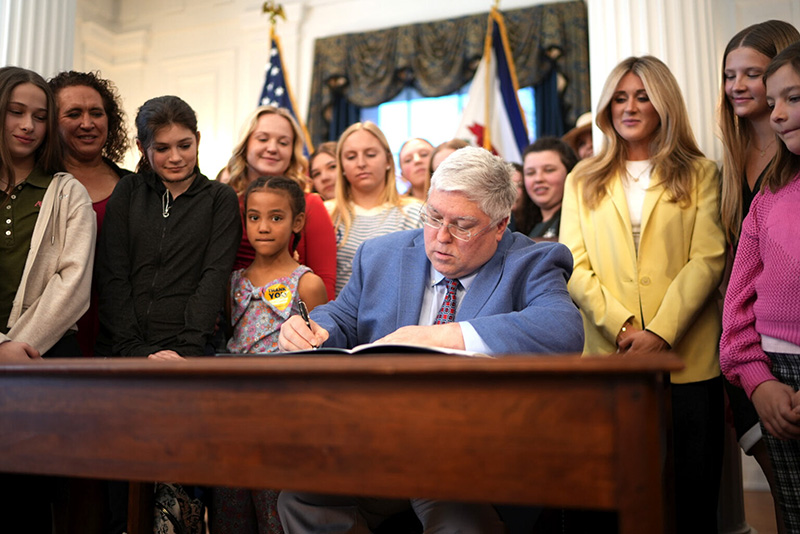Bills Targeting Trans Youth Vetoed By North Carolina Governor
Roy Cooper blocks ban on gender-affirming care, restrictions on transgender athletes, and "Don't Say Gay"-style "parental rights" law.

On Wednesday, North Carolina Democratic Gov. Roy Cooper vetoed three bills targeting transgender youth, setting up a likely effort by the state’s Republican-dominated legislature to override him.
Cooper’s vetoes are similar to those issued by other Democratic governors in Republican-controlled states, where lawmakers have seized on discomfort with gender-nonconformity and parental concerns over LGBTQ visibility in schools or the public square as a wedge issue that they believe they can exploit for political gain in upcoming election cycles.
Due to the GOP’s supermajority in the legislature and the increasing unwillingness of Republicans to buck their party’s stance on LGBTQ issues (lest right-wing pundits and potential primary challengers target them), it is likely that Cooper’s vetoes will ultimately be overturned and all three measures will become law.
Republican lawmakers overturned eight other vetoes by Cooper earlier this year, including bills focusing on incendiary culture-war issues, such as measures to impose further restrictions on abortion or eliminate existing restrictions on gun purchases.
The three anti-trans bills vetoed by Cooper were a ban on gender-affirming care for minors, a ban on transgender athletes in female-designated sports, and a bill requiring schools to “out” transgender, nonbinary, or gender-nonconforming students to their parents.
The latter bill also mimics part of Florida’s “Don’t Say Gay” law, prohibiting instruction on “gender identity, sexual activity, or sexuality” in kindergarten through fourth grade.
In a statement announcing his veto of the bills, Cooper accused Republicans of “scheming for the next election” by “hurting vulnerable children” and pushing “political culture wars.”
He likened the measures to the state’s infamous HB 2 “bathroom bill” restricting transgender access to certain public multi-user facilities, which passed in 2016 and led to a large-scale economic backlash against the state.
“A doctor’s office is no place for politicians, and North Carolina should continue to let parents and medical professionals make decisions about the best way to offer gender care for their children,” Cooper said of the restrictions on gender-affirming care, which prohibit rarely-recommended surgical procedures, hormone therapy, and puberty blockers, as well as mental health therapy that affirms a trans-identifying youth’s gender identity.
“Ordering doctors to stop following approved medical protocols sets a troubling precedent and is dangerous for vulnerable youth and their mental health,” Cooper added. “The government should not make itself both the parent and the doctor.”
Regarding the ban on transgender athletes, Cooper expressed concerns that the bill would send a message to corporate America that the state is overly hostile to the LGBTQ community, pointing to vetoes of similar bills by Republican governors in North Dakota, Indiana, and Utah.
He also argued that localities and local governing bodies of sports already have policies determining athlete eligibility in place, eliminating the need for the proposed law.
“We don’t need politicians inflaming their political culture wars by making broad, uninformed decisions about an extremely small number of vulnerable children that are already handled by a robust system that relies on parents, schools and sports organizations,” Cooper said in a statement.
Cooper acknowledged that parents play a major role in their children’s education. But he expressed concerns that the bill would intimidate teachers into silence by increasing their level of uncertainty about whether overzealous administrators and parents may object to their lesson plans or accuse them of “indoctrinating” students on LGBTQ issues.
He also alluded to the idea that trans-identifying children may reach out to teachers for advice or resources before coming out to their parents.
“Parents are the most essential educators for their children and their involvement must be encouraged, but this bill will scare teachers into silence by injecting fear and uncertainty into classrooms,” Cooper said in a statement. “This ‘Don’t Say Gay’ bill also hampers the important and sometimes lifesaving role of educators as trusted advisers when students have nowhere else to turn.
“The rights of parents are well established in state law, so instead of burdening schools with their political culture wars, legislators should help them with better teacher pay and more investments in students.”
Republican legislators criticized the vetoes, indicating they intended to override them, and sought to portray Cooper as beholden to far-left interests and political donors, as reported by the Winston-Salem Journal.
“[P]arents know what is best for their children,” said Sens. Amy Galey (R-Burlington) and Michael Lee (R-Wilmington), the lead co-sponsors of the education restrictions bill. “Gov. Cooper continues to mislead the public about the Parents’ Bill of Rights so he can drum up manufactured outrage and rake in donations. This bill encourages collaboration, promotes transparency, and keeps classrooms focused on educating, not indoctrinating.”
Meanwhile, Sen. Vickie Sawyer (R-Mooresville) slammed Cooper for vetoing the trans sports ban, accusing the governor of having “no interest in supporting female athletes, only his far-left donors that want to erase women by refusing to acknowledge biology.”
Sen. Joyce Krawiec (R-Kernersville) blasted Cooper for having “turned a blind eye to the protection of children,” arguing that the ban on gender-affirming care is the “safest approach” to treating children suffering from gender dysphoria by forcing them to wait until adulthood before pursuing “life-altering” and irreversible medical interventions.
Proponents of the ban on gender-affirming care have also noted that it contains exceptions for children who have already begun puberty blockers and hormones prior to the bill’s effective date of Aug. 1.
The exception allows those trans-identifying youth to continue receiving such treatments as long as a medical provider has “deemed the continuation or completion to be medically necessary” and the youths’ parents consent to allow them to continue the treatment.
Even though at least 20 other states have enacted laws banning or severely restricting access to gender-affirming care, many such measures have encountered resistance in the courts.
Last month, a federal judge struck down an Arkansas law prohibiting gender-affirming care as unconstitutional. Similar restrictions in Alabama, Florida, Kentucky, Tennessee, and Indiana have been blocked from taking effect on the grounds that they may be unconstitutional, while Oklahoma’s ban cannot be enforced under a binding non-enforcement agreement.
A similar ban in Louisiana was vetoed by Democratic Gov. John Bel Edwards, but may be enacted if Republicans can marshal enough votes for an override.
LGBTQ advocates and allies praised Cooper’s vetoes.
“Legislators are using their power to bully an already vulnerable community, and Governor Cooper has taken an important step by vetoing these bills,” Liz Barber, the senior policy counsel for the ACLU of North Carolina, said in a statement.
Kendra Johnson, the executive director of Equality NC, blasted all three bills as “dangerous, cruel, and deeply unpopular.”
“These bills would tarnish North Carolina’s reputation as an inclusive and welcoming place to live, work, and visit — and they would cause immense damage to transgender and queer youth, who already experience significant disparities,” Johnson said.
Support Metro Weekly’s Journalism
These are challenging times for news organizations. And yet it’s crucial we stay active and provide vital resources and information to both our local readers and the world. So won’t you please take a moment and consider supporting Metro Weekly with a membership? For as little as $5 a month, you can help ensure Metro Weekly magazine and MetroWeekly.com remain free, viable resources as we provide the best, most diverse, culturally-resonant LGBTQ coverage in both the D.C. region and around the world. Memberships come with exclusive perks and discounts, your own personal digital delivery of each week’s magazine (and an archive), access to our Member's Lounge when it launches this fall, and exclusive members-only items like Metro Weekly Membership Mugs and Tote Bags! Check out all our membership levels here and please join us today!


























You must be logged in to post a comment.